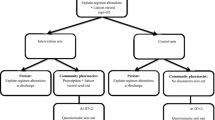Abstract
Background
Multiple medication changes are common after bariatric surgery, but pharmacist assistance in this setting is not well described. This study evaluated the feasibility and effectiveness of a pharmacy-led initiative for facilitating discharge medicine reconciliation after bariatric surgery.
Methods
A standardized post-operative pharmacy consult evaluation was conducted on bariatric surgery inpatients at a single academic center starting 1/2/2019. Retrospective chart review evaluated patient characteristics, medication changes, and 30-day outcomes pre-intervention (7/2018–12/2018) and post-intervention (1/2019–12/2019). Two-sample t tests or binomial tests were used for continuous or categorical variables, respectively; a p-value of < 0.05 was deemed statistically significant.
Results
A total of 353 patients were identified for study inclusion (n = 158 pre-intervention, n = 195 post-intervention) with a mean age of 45 years, 87% female, and 71% sleeve gastrectomy. Overall pharmacy consultation compliance was 94% with 77.0% of home medication recommendations followed. Non-narcotic pain medication prescription use significantly increased (39% pre- vs. 54% post-intervention; p < 0.001). At discharge, the average number of changed or new medications significantly increased (3.7 ± 1.2 pre- vs. 4.2 ± 1.8 post-intervention; p = 0.003) while the average number of stopped medications was similar (1.2 ± 1.5 pre- vs. 1.5 ± 1.9 post-intervention; p = 0.09). Anti-hypertensive medications were decreased or stopped substantially more often with pharmacist input (44.7% pre- vs. 85.4% post-intervention; p < 0.001). Three medication-related readmissions happened pre-intervention with none post-intervention. Outpatient medication-related phone calls did considerably increase (31% pre- vs. 39% post-intervention; p = 0.04), while overall 30-day readmissions significantly decreased (7.6% pre- vs. 1.5% post-intervention; p = 0.04).
Conclusions
Inpatient pharmacy consultation facilitated rapid alteration to more appropriate therapy for hypertension management and significantly increased use of non-narcotic pain medications upon discharge among bariatric surgery patients. Improved protocol adherence is anticipated with program maturity and patient education interventions will be deployed to address outpatient phone calls.

Similar content being viewed by others
References
Meldrum DR, Morris MA, Gambone JC (2017) Obesity pandemic: causes, consequences, and solutions—but do we have the will? Fertil Steril 107:833–839. https://doi.org/10.1016/j.fertnstert.2017.02.104
Obesity and overweight. https://www.who.int/en/news-room/fact-sheets/detail/obesity-and-overweight. Accessed 5 Mar 2020
Sturm R, Hattori A (2013) Morbid obesity rates continue to rise rapidly in the United States. Int J Obes (Lond). https://doi.org/10.1038/ijo.2012.159,37:889-891
Buchwald H, Avidor Y, Braunwald E, Jensen MD, Pories W, Fahrbach K, Schoelles K (2004) Bariatric Surgery A Systematic Review and Meta-analysis. JAMA. https://doi.org/10.1001/jama.292.14.1724,292:1724-1737
Hodo DM, Waller JL, Martindale RG, Fick DM (2008) Medication use after bariatric surgery in a managed care cohort. Surg Obes Relat Dis. https://doi.org/10.1016/j.soard.2008.01.008,4:601-607
Elliott JP, Gray EL, Yu J, Kalarchian MA (2015) Medication Use among Patients Prior to Bariatric Surgery. Bariatr Surg Pract Patient Care. https://doi.org/10.1089/bari.2015.0006,10:105-109
Crémieux P-Y, Ledoux S, Clerici C, Cremieux F, Buessing M (2010) The Impact of Bariatric Surgery on Comorbidities and Medication Use Among Obese Patients. Obes Surg. https://doi.org/10.1007/s11695-010-0163-6,20:861-870
Sjöström L, Lindroos A-K, Peltonen M, Torgerson J, Bouchard C, Carlsson B, Dahlgren S, Larsson B, Narbro K, Sjöström CD, Sullivan M, Wedel H (2004) Lifestyle, Diabetes, and Cardiovascular Risk Factors 10 Years after Bariatric Surgery. N Engl J Med. https://doi.org/10.1056/NEJMoa035622,351:2683-2693
Segal JB, Clark JM, Shore AD, Dominici F, Magnuson T, Richards TM, Weiner JP, Bass EB, Wu AW, Makary MA (2009) Prompt Reduction in Use of Medications for Comorbid Conditions After Bariatric Surgery. Obes Surg. https://doi.org/10.1007/s11695-009-9960-1,19:1646-1656
Dimitriadis GK, Randeva MS, Miras AD (2017) Potential Hormone Mechanisms of Bariatric Surgery. Obes. Rep, Curr. https://doi.org/10.1007/s13679-017-0276-5,6:253-265
Pedal R, Brocks D, Sharma AM (2010) A systematic review of drug absorption following bariatric surgery and its theoretical implications. Obes Rev. https://doi.org/10.1111/j.1467-789X.2009.00614.x,11:41-50
Ariano RE, Demianczuk RH, Danzinger RG, Richard A, Milan H, Jamieson B (1995) Economic impact and clinical benefits of pharmacist involvement on surgical wards. Can J Hosp Pharm. https://doi.org/10.4212/cjhp.v48i5.2320,48:284-289
Busetto L, Dicker D, Azran C, Batterham RL, Farpour-Lambert N, Fried M, Hjelmesæth J, Kinzl J, Leitner DR, Makaronidis JM, Schindler K, Toplak H, Yumuk V (2018) Practical Recommendations of the Obesity Management Task Force of the European Association for the Study of Obesity for the PostBariatric Surgery Medical Management. Obes Facts. https://doi.org/10.1159/000481825,10:597-632
Graham Y, Callejas-Diaz L, Parkin L, Mahawar K, Small PK, Hayes C (2019) Exploring the Patient-Reported Impact of the Pharmacist on Pre-bariatric Surgical Assessment. Obes Surg. https://doi.org/10.1007/s11695-018-3592-2,29:891-902
Silverman JB, Catella JG, Tavakkolizadeh A, Robinson MK, Churchill WW (2011) Bariatric Surgery Pharmacy Consultation Service. Obes Surg. https://doi.org/10.1007/s11695-011-0455-5,21:1477-1481
Lexicomp: Evidence-Based Drug Referential Solutions | Wolters Kluwer. https://www.wolterskluwer.com/en/solutions/lexicomp. Accessed 2 Jan 2019
R: The R Project for Statistical Computing. https://www.r-project.org/. Accessed 20 Aug 2020
Acknowledgements
The authors are grateful to Daryl Todd, Clinical Nurse Specialist, for his incredible work and efforts to create and promote the standardized post-operative pharmacy consult process. The authors would also like to thank Melissa Majumdar, Bariatric Coordinator, for her efforts to help implement the standardized medication education fact sheet as well as ongoing support and communication with the pharmacy, surgical, and nursing staff to ensure successful completion of the pharmacotherapy consult initiative.
Funding
None.
Author information
Authors and Affiliations
Corresponding author
Ethics declarations
Disclosures
Drs. Falconer, Harris, Van Pooyan, Hicks, Singh, Davis, Lin, Sharma, Pollock, Samara, and Hechenbleikner have no conflicts of interest or financial ties to disclose.
Additional information
Publisher's Note
Springer Nature remains neutral with regard to jurisdictional claims in published maps and institutional affiliations.
Supplementary Information
Below is the link to the electronic supplementary material.
Rights and permissions
About this article
Cite this article
Falconer, E.A., Harris, D.A., Van Prooyen, A. et al. Pharmacy-led initiative for improving peri-operative medication reconciliation among bariatric surgical patients: what is the role?. Surg Endosc 36, 1593–1600 (2022). https://doi.org/10.1007/s00464-021-08343-y
Received:
Accepted:
Published:
Issue Date:
DOI: https://doi.org/10.1007/s00464-021-08343-y




